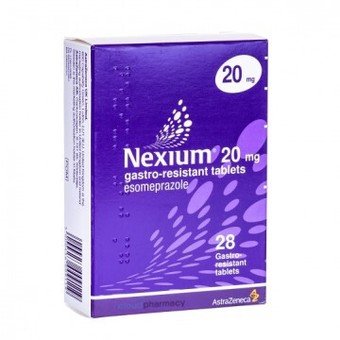Medication features
Nexium, the brand name of generic esomeprazole, is a drug which is used to help reduce the production of stomach acid to reduce the symptoms of acid reflux and indigestion
- Used to treat acid reflux and heartburn
- Provides up to 24 hours of relief
- Branded version of Esomeprazole
Overview
What Are Nexium Tablets?
Nexium, commonly known as esomeprazole, is a proton pump inhibitor (PPI) medication used to treat stomach and oesophagus-related conditions. Proton pumps are enzymes located in the lining of your stomach. This medication works to prevent the enzymes from creating excess stomach acid.
It is widely prescribed to patients suffering from conditions related to excess stomach acid, such as stomach ulcers, heartburn and acid reflux, indigestion, and gastroesophageal reflux disease (GERD). Esomeprazole is the active ingredient, and Nexium is the brand name this medication is sold under.
Nexium is available as a tablet, capsule, and granules. If you struggle to swallow tablets, your doctor may prescribe granules. You can use the granules to turn the medication into a liquid, making it easier to ingest. The sooner you take this medication, the quicker you can speed up your recovery time.
How Does Nexium Work?
Nexium effectively reduces the level of acidity and the amount of acid produced inside the stomach. It does this by blocking a system in the cells of your stomach called the proton pump. The proton pump works in the final step of acid production. When the proton pump is blocked, your stomach makes less acid, which helps to ease symptoms like stomach pain and nausea.
As well as reducing the amount of acid in the stomach, Nexium tablets combat symptoms of acid reflux by healing acid damage. For Nexium tablets to reach full effectiveness, the correct dosage must be taken. Listen to the guidance from your doctor/pharmacist. You only need to take one Nexium tablet a day.
Nexium and Alcohol
It is safe to drink alcohol when taking Nexium tablets, although it is not recommended. Alcohol can increase the amount of acid in your stomach, enhancing the severity of symptoms such as stomach pain. If possible, limit your alcohol intake or avoid alcohol altogether. Be aware that alcohol irritates your stomach lining, so you may experience discomfort after consuming it. Talk to your doctor/GP, who will be able to offer some guidance, and outline the risks.
Can I Take Nexium While Pregnant?
There is not enough adequate research to suggest that Nexium tablets affect pregnant women. However, due to this lack of information, taking them could be a risk. So, it is not recommended. If you struggle to control your symptoms, speak to your doctor/GP. They may recommend some natural methods such as eating small, frequent meals.
If you are a breastfeeding mother, it is safe to take Nexium tablets, but only if your doctor/health visitor says it is appropriate. There is insufficient evidence on whether Nexium will pass through to breast milk. However, the likelihood of your baby encountering side effects is unlikely.
Guardium vs Nexium
Both Guardium and Nexium are proton pump inhibitors with the same active ingredient. They are effective treatments for acid reflux and other issues related to excess stomach acid. Both medications stop proton pumps from releasing acid into the stomach, helping to ease symptoms such as nausea and stomach pains.
Although both tablets work in the same way, there are differences in their chemical makeup. Nexium only contains one isomer of the drug omeprazole, while Guardium contains two. The two medications also differ in price. Nexium tablets are cheaper than Guardium tablets. However, there is not a huge price gap between them.
Additionally, the side effects of the two are similar. Nexium and Guardium tablets can cause diarrhoea, abdominal pain, and constipation.
Nexium vs Omeprazole
Nexium and Omeprazole are two similar medications. Both are effective in treating acid reflux and are proton pump inhibitors (PPI). However, much like Guardium, the two also have their differences.
Both are sold under their own brand names as they contain different active ingredients. Omeprazole is an ingredient sold under the brand name Prilosec. Nexium is the brand name of the active ingredient esomeprazole. The chemical makeup is different. Nexium tablets contain one isomer of Omeprazole, while Prilosec contains two.
Both share many similarities. Nexium and Omeprazole have the same side effects. However, research shows that common side effects of Omeprazole happen in more than 1 in 100 people. Similar side effects include diarrhoea, nausea, and stomach pains.
Nexium Reviews
The majority of Nexium reviews are positive. Many users recognise this as an effective treatment for issues such as acid reflux. Not only is the medication praised for its ability to minimise symptoms related to excess stomach acid, but it is also easy to use. Nexium is available in three different forms. Users who struggle to ingest tablets - enjoyed the option of capsules or granules.
Some reviewers did express concerns over side effects. Like all medications, there are some associated side effects with Nexium tablets. However, most users describe them as temporary. Overall, Nexium tablets are an effective treatment and one that seems to be used by many.
Can You Buy Nexium Over the Counter?
You can buy Nexium tablets over the counter in the UK provided they are in packs of fourteen 20mg tablets. You will need a prescription for 40mg tablets.
You cannot buy Nexium tablets online unless you are confident that you are not currently taking any other medication that could interfere with it. If not, you can use Cloud Pharmacy's online pharmacy to buy them. You will be asked to complete a short online consultation before the medication can be dispensed. Once you have been approved by one of our online pharmacists, the medication will be dispensed and dispatched to you in a discreet package with next-day delivery.
Directions
Side Effects
Patient Information Leaflet
Nexium FAQs
Related Guides
Delve into a variety of content written by our medical experts
Nexium Reviews
Confirm Nexium treatment selection
| 20mg | 28 | £33.99 |
















